Ottawa's donation bin policies not strict enough, charities say
Several boxes at city facilities belong to a charity that has reported no revenue from 2 years of donations
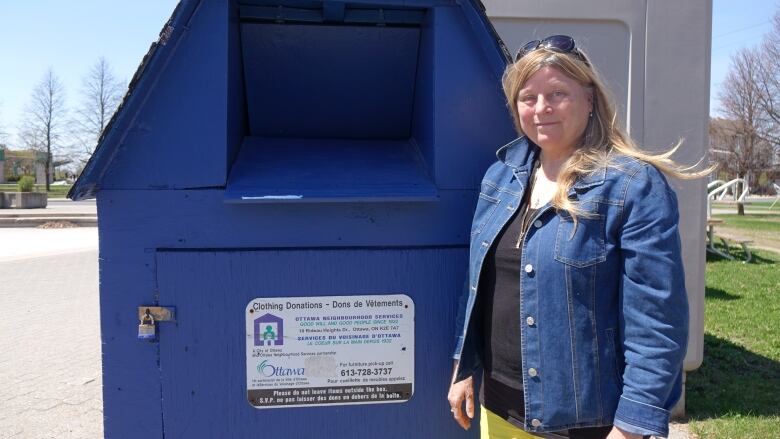
City hall needs to do a better job of vetting organizations that place clothing donation bins at city facilities, say some local charities.
The City of Ottawa permits organizations to place bins at recreation centres, fire stations and other city properties if they can provide proof of registered charitable status. Issued licences are then reviewed and renewed annually.
One of those organizations is theCanadian Community Support Foundation (CCSF), which operates 15 of the 49 bins permitted on city property, in addition to the foundation'sbins on private property.Its Facebook page alsoadvertises home pickup for donations in communities around Toronto.
However, the charity has reported norevenue from donations to the Canada Revenue Agency in either 2016 or 2017. It also lists no directors or trustees in any of its filings to the agency.
'Need to take a hard look'
The CCSFbins don't sit well with Patricia Lemieux, president of Ottawa Neighbourhood Services, who began sounding the alarm over the arrival of for-profit bin operators in 2011 andcomplained to the city about the foundation.
The boxes have cut into her charity's own revenue stream, she said, and Ottawa Neighbourhood Services is fighting for survival.It was evicted over unpaid rentin 2016 and now uses storage lockers to house the goods it collects for the poor through its own boxes.
"Ottawa Neighbourhood Services and other charities rely on the donations to survive," said Lemieux, who has permission for 21 boxes at city facilities."And when that's being taken away, and it's not supporting anybody in the community, I think that says it all.
"You need to take a hard look at what you can do to preserve the legacy of charities that have been longstanding in this city and that really do help the community."
The CCSF also has a record of problems with bins onprivate property, includingone on Wellington Westthata local business group struggled to remove. Another CCSFbin continues to sit on a vacant lot on Isabella Street near the Queenswayeven though the property manager for the sitetold CBC Mondayit had beeninstalled without permission. The information listed on the box does not fully comply with the city's bylaw for donationbins.
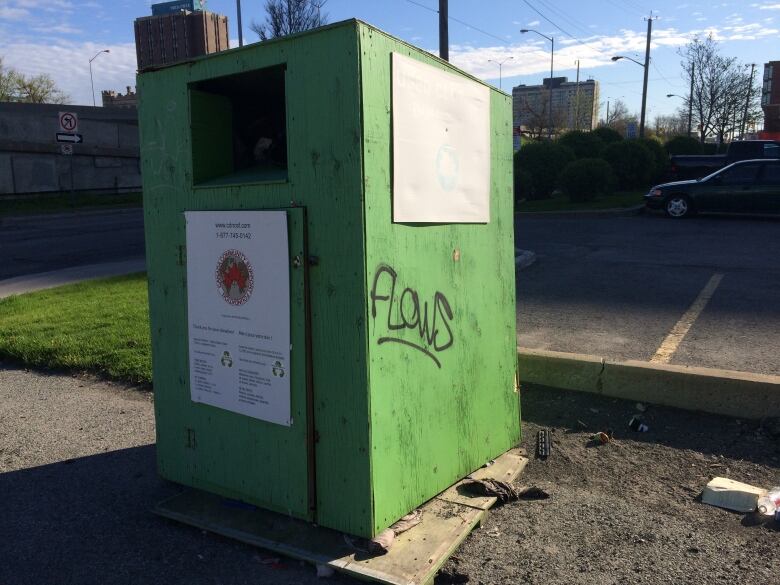
Charity tied to bin thefts
According to Canada Revenue Agency records, the Canadian Community Support Foundation is registered in Etobicoke and obtained registered charitable status in 2013.
The organization's website says it "provides a safety net for those at risk of falling through the cracks." It has contributed to some charitable causes in Ottawa, according to the site, including a a $23,000 donation to the United Way in March 2013, a truckload of turkeys for the Ottawa Mission's annual turkey dinner in 2014, and a$1,000 donation to the Harmony House women's shelter in 2015.
Recently, however, the CCSFmade headlines in Ottawa because of criminal charges.
In February, a person connected with the foundationwas charged with possession of property obtained by crime over $5,000and two counts of mischief after bins were allegedlytaken from several other charities.
Brennan Cartier, whom the foundation identified in 2013 as its regional director, was charged after a dozen bins were discovered at a storage facility in Richmond. Police accuse him of repainting the bins to cover up the logos of the othercharities, and placing them back in parking lots for his own operation.
A trial date has not yet been set and Cartier did not return a call from CBC seeking comment.
One of the bins found at the storage facilitybelonged to Big Brothers Big Sisters Ottawa, according to executive director Susan Ingram, and was one of six that disappeared the same night.
Ingram was reluctant to comment on whether the CCSF should be allowed to place bins on city property with charges outstanding against Cartier, but when asked if permission should be revoked in the event of a conviction, she said "absolutely."
A well-placed bin can bring in thousands of dollars a month for her organization, Ingram said, and she'd welcome the chance to open more at city facilities. Currently, Big Brothers Big Sisters Ottawa has just two bins on city propertyand several others at schools in the Ottawa Catholic School Board.
"I think there's a lot of opportunity to vet the charities that are placing these bins," Ingram said.
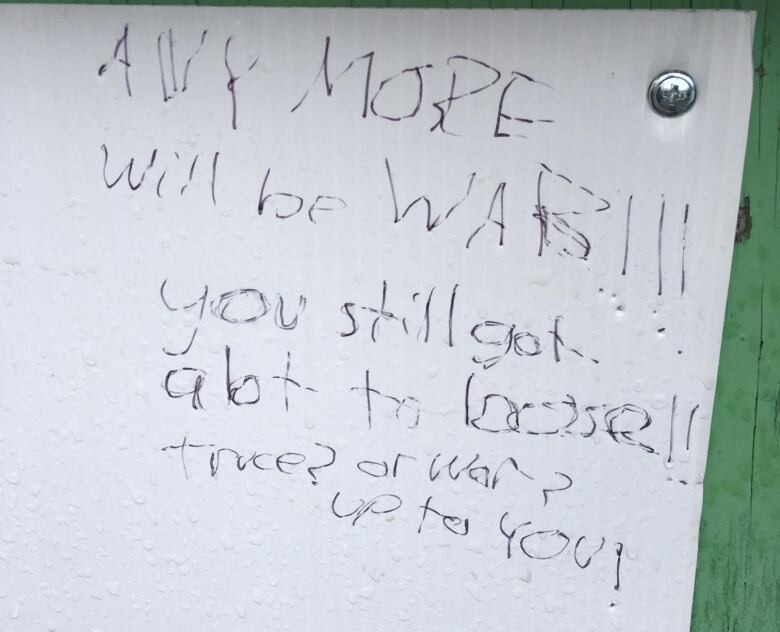
Foundation works with private textile recycler
The Canadian Community Support Foundation did not respond to calls or emails from CBCseeking comment.
Instead, a response came from Daniela Siggia, vice-president of a private for-profit company called Textile Waste Diversion (TWD), which, according to the company's Facebook page, is also based in Etobicoke. She agreed to answer CBC's questions only by email.
Textile Waste Diversion buys clothes from the CCSF as well as other charities and companies, Siggiasaid, and arranges for them to be resold in thrift stores, exported, orin some cases, turned into industrial rags.
Siggia compared TWD's business to that of the Value Village chain of retail thrift shops, which buyused clothing from charities including someof those that operatebins at City of Ottawa facilities and sellit to make a profit.
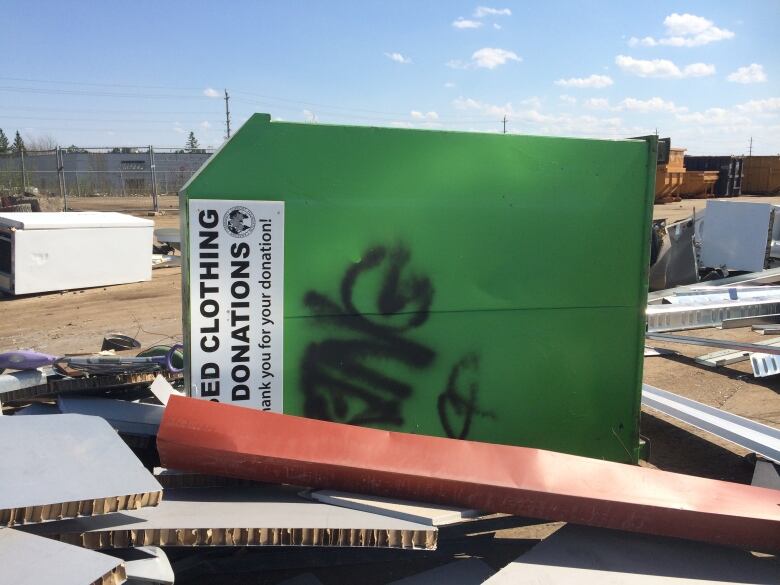
However, the relationship between the CCSF and TWD appears to be closer than seller and buyer, in thatTWD's website refers to CCSF bins as "our bins."
Siggia said this merely reflects a recent change in the relationshipdesigned to help CCSF recover from theft and damage caused by "pirate operating companies."
"In order for them to have a chance at recovery, our arrangement with them had to change," Siggia said. "TWD has now supplied thembins as they did not have the resources to purchase them directly."
Since January, CCSF has had more than 50 bins vandalized or stolen, Siggiasaid. She suspects a for-profit bin operator is to blame, and went as far as to suggest that Brennan Cartier had in fact been framed by that same operator.
Siggiaprovided CBCwith a photo of a threat she said was posted recently on one of CCSF'sdamaged bins."Any more will be war!" the scrawled note reads. "You still gota lot to loose!! (sic) Truce? Or war? Up to yo
Lemieuxherselfmay have witnessedthetheftof a CCSFbinlast Wednesday. She called CBC to report onebeing loaded onto atruckon Baseline Road, and thenfollowed that truckto a scrapyard in Nepean.
Siggiatold CBCthebin hadn't been moved by them and was in fact stolen.
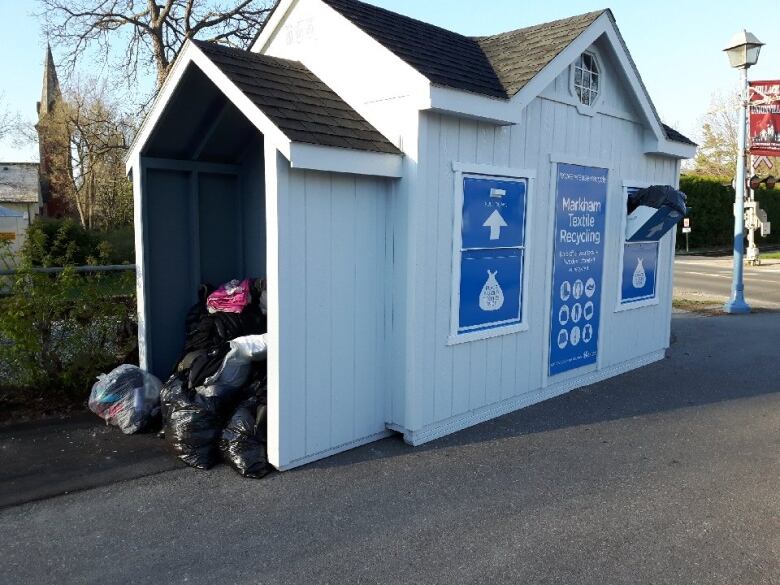
City of Markham has unique approach to bin wars
Other communitiesaround the province are dealing with similar conflicts around donation bins.
In Markham, the city has taken a radical approach. In 2016, it began requiringcharities to apply for the right to operate bins on any property in the city, public or private.
To qualify for the program, charities must not only provide proof of registered charitable status, they must also supply additional financial information and a list of board members.
If they're approved, the city then permits them to buy bins with City of Markhambranding, and to make arrangements to place their bins on public or private property. All the revenue from donations to a binmust be used to support the affiliated charity, according to Claudia Marsales, the city's senior manager of waste and environmental management.
"Our residents love this program," Marsales said.
There has been pushback from other quarters, however.
Chris Alexander, Markham's acting manager of bylaw and regulatory services, said a couple of the new city-sanctioned bins have been stolen.
Thosestolen bins had been installed after the city removed others in the same locations that were operated by the Canadian Community Support Foundation, Alexander said.
After the city bins were stolen, new unlabelled bins appeared in their place.












_(720p).jpg)


 OFFICIAL HD MUSIC VIDEO.jpg)
.jpg)



























































































